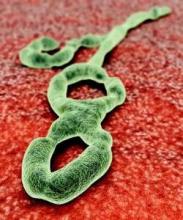User login
The U.S. Department of Health & Human Services’ Office of Assistant Secretary for Preparedness and Response (ASPR) and Regeneron Pharmaceuticals have entered into an agreement for the purpose of advancing the development of a new experimental drug for treating the Ebola virus disease, according to a statement from the department.
The agreement represents the newest contribution of ASPR’s Biomedical Advance Research and Development Authority (BARDA) toward fighting the Ebola epidemic in West Africa. BARDA has promised to pay up to $38 million for the drug’s development and manufacturing, including the filing of an investigational new drug application with the Food and Drug Administration. All of the drug produced will be used in studies. “BARDA also could provide an additional $11.3 million to manufacture alternative monoclonal antibodies,” the statement indicates.
The experimental drug is based on three fully human monoclonal antibodies, which bind to a key Ebola viral protein and neutralize the virus. This decreases the amount of virus in the body that a patient’s immune system has to fight.
The drug company’s “technology facilitated the discovery and development of this monoclonal antibody therapeutic candidate in real time in just nine months as compared to the normal development cycle of several years, and the technology may have potential applications in future public health responses,” said BARDA Director Robin Robinson, Ph.D., in the statement.
The U.S. Department of Health & Human Services’ Office of Assistant Secretary for Preparedness and Response (ASPR) and Regeneron Pharmaceuticals have entered into an agreement for the purpose of advancing the development of a new experimental drug for treating the Ebola virus disease, according to a statement from the department.
The agreement represents the newest contribution of ASPR’s Biomedical Advance Research and Development Authority (BARDA) toward fighting the Ebola epidemic in West Africa. BARDA has promised to pay up to $38 million for the drug’s development and manufacturing, including the filing of an investigational new drug application with the Food and Drug Administration. All of the drug produced will be used in studies. “BARDA also could provide an additional $11.3 million to manufacture alternative monoclonal antibodies,” the statement indicates.
The experimental drug is based on three fully human monoclonal antibodies, which bind to a key Ebola viral protein and neutralize the virus. This decreases the amount of virus in the body that a patient’s immune system has to fight.
The drug company’s “technology facilitated the discovery and development of this monoclonal antibody therapeutic candidate in real time in just nine months as compared to the normal development cycle of several years, and the technology may have potential applications in future public health responses,” said BARDA Director Robin Robinson, Ph.D., in the statement.
The U.S. Department of Health & Human Services’ Office of Assistant Secretary for Preparedness and Response (ASPR) and Regeneron Pharmaceuticals have entered into an agreement for the purpose of advancing the development of a new experimental drug for treating the Ebola virus disease, according to a statement from the department.
The agreement represents the newest contribution of ASPR’s Biomedical Advance Research and Development Authority (BARDA) toward fighting the Ebola epidemic in West Africa. BARDA has promised to pay up to $38 million for the drug’s development and manufacturing, including the filing of an investigational new drug application with the Food and Drug Administration. All of the drug produced will be used in studies. “BARDA also could provide an additional $11.3 million to manufacture alternative monoclonal antibodies,” the statement indicates.
The experimental drug is based on three fully human monoclonal antibodies, which bind to a key Ebola viral protein and neutralize the virus. This decreases the amount of virus in the body that a patient’s immune system has to fight.
The drug company’s “technology facilitated the discovery and development of this monoclonal antibody therapeutic candidate in real time in just nine months as compared to the normal development cycle of several years, and the technology may have potential applications in future public health responses,” said BARDA Director Robin Robinson, Ph.D., in the statement.

